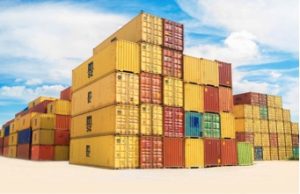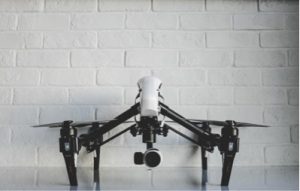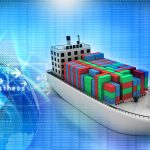3 Tech Innovations Shaking Up the Supply Chain
This is a guest blog post by Daniel Lummis
Though never introduced as a formal concept in business management until the 20th century, the supply chain has nevertheless been the foundation of commerce and business. It encompasses companies, businesses, and entire industries in each step that it takes to bring a product or service to a customer, from the suppliers of raw materials, to the part manufacturers, to the assembly companies, to customers, and on to the end users.

Shipping Containers Picture: https://unsplash.com/photos/tjX_sniNzgQ
But like much of the world, the supply chain is changing, and as technological innovations enter the corporate consciousness, companies gravitate towards these innovations, thinking of ways to implement them into their business processes and improve production.
Quite a few of these innovations came onto the scene as 2017 drew to a close, and companies in 2018 have been working towards getting them fully integrated into their systems to create the businesses of the future. Let’s take a look at a few.
Big Data and Advanced Analytics
What do customers want? Why do they choose the products they choose? How can we figure out what product they will buy next? How can we get them to choose our product instead of the competition’s the next time they look for something to buy?
These are the most fundamental questions of marketing departments around the world, and these questions have for a long time been answered with anonymous customer surveys, advertising campaigns, and the like.
More recently, this has been made easier thanks to the rise of social media networks, e-commerce platforms, and sites like Facebook Marketplace that manages to seamlessly combine the two. However, companies are now latching onto a new idea that would answer those key marketing questions not just for the present but also for the future. This idea is called “big data.”

Big Data & Advanced Analytics Picture: https://unsplash.com/photos/dBI_My696Rk
Big data refers to the application of massive sets of data for corporate use. E-commerce platforms and online marketplaces collect a lot of data from its customers – demographic data, purchasing habits, response to advertising campaigns, customer product reviews, and more.
The sheer amount of collected data means humans cannot process it in a reasonable amount of time; however, computers equipped with statistical models can be used to analyze these datasets to gain more detailed insights on customer trends and help predict future customer purchases. Statistical data obtained from suppliers could be used to optimize delivery schedules, and customer trend data could be used to reorganize production rates to meet predicted demand.
This use of advanced analytics can be used throughout the supply chain to further optimize processes, predict and capitalize on future trends, and mitigate or avoid mishaps throughout the supply chain. And because computers can be left to do all of the tedious number-crunching, company analysts can focus more time on formulating business plans and make better decisions as a result.
Automation and the Internet of Things
Supply chains in just about every industry are already familiar with the concept of automation – in simple terms, getting machines to do the heavy, unsafe, or otherwise difficult work so humans don’t have to.
Companies, however, are recently looking towards taking automation to the next level through the implementation of more sophisticated computer systems. For example, some companies are now creating what’s known as the ‘smart warehouse’, a warehouse operated almost entirely by robots that store, arrange, and retrieve inventory with only a few taps on an interactive console. More recently, the robots in these automated systems are now being upgraded with the capability to connect to the Internet of Things (IoT) – a specialized network that allows robots and automated machines to connect, communicate, and cooperate with each other to perform tasks more efficiently and with better synchronization.
At this stage in the game, however, automation still has some way to go before it achieves the ideals set forth by writers and technologists alike.

Drone Picture: https://unsplash.com/photos/LrL45dXXvJ8
Although automated systems are working quite effectively in warehouses; factories; and other localized, controlled environments, these systems could not be taken out into the open world – we still do not have the technology to make these systems interact in live, real-world applications.
However, some of the world’s leading tech companies are working to make this concept into reality, with one such company actively developing an automated delivery system using autonomous drones.
Related: AMAZON’S U.S. DELIVERY DRONE MARKS SHIPPING’S MOVE TOWARD AUTOMATION
Artificial Intelligence and Machine Learning
At the core of many of the innovations that are being implemented across various industries is artificial intelligence and machine learning. This is no surprise, as much of the latest technological innovations make use of more advanced AI with learning capabilities.
There is a steadily growing body of research on neural networks, which process large datasets to gain information on how to create new content based on that existing data. These neural networks are projected to have a lot of potential in predictive and prescriptive analytics applications.
Machines in warehouses and production facilities can be upgraded with AI, giving them a higher degree of automation. More specifically, these machines will now have the ability to make lower-level decisions on their own (such as shutting down if they require maintenance), and communicate with other machines to coordinate their movements.
At the same time, artificial intelligence is actively being developed and improved upon to assume the role as the ‘brain’ of all autonomous vehicles, with the most recognizable examples found in autonomous electric cars. This type of AI will make use of data constantly streamed to it through various sensors installed in the vehicle, allowing it to make decisions and react to the behavior of other vehicles on the road without the need for a human driver at the wheel.
Related: WORLD’S FIRST AUTOMATED CARGO SHIP IS ON THE WAY
A lot of the innovations and technologies discussed here might seem a bit futuristic or a bit like science fiction. But believe it or not, those technologies are already here. The future is here, the future is now, and as companies figure out new and interesting ways to integrate these technologies into the supply chain, the industry will forever be changed and redefined – at least until the next big thing rolls around in a few years.
This was a guest blog post by Daniel Lummis
Author Bio
Daniel Lummis – Marketing Consultant at Reef Group. Reef Group are a transport and logistics provider based in Perth, Western Australia. Their team has been serving Australia since 2002 and comes with over 40 years of combined industry experience.





Great article! Mobiles are already becoming imperative in supply-chain management. The next thing to look out for, will be the role of blockchain in the field of logistics, to ensure traceability and transparency in the system.
Interesting stuff. The data analytics space is still in its infancy in my opinion. If you look at what many companies do their data gathering and analysis is still in its beginning stages and is very patchy and incomplete. Some companies are very data analytics focused but I’ve found that ones that conduct themselves in areas of operation rather than analysis (ie a lumber processing company over a stock broker) tend to have very primitive data analytics giving them a great deal of room to improve and benefit.
Love this website! You guys have an amazing archive here of pretty much anything to do with logistics. It’s super helpful! Thanks! <3